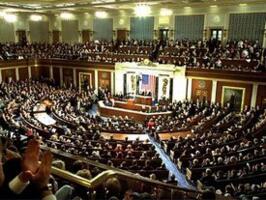Voters Don't Like Political Class Bossing Them Around
A Commentary By Scott Rasmussen
There are many ways to describe the enormous gap between the American people and their elected politicians.
Most in official Washington tend to think that their elite community is smarter and better than the rest of us. Many hold a condescending view of voters and suggest that the general public is too ignorant to be treated seriously. Only 5 percent of the nation's voters, however, believe that Congress and its staff members represent the nation's best and brightest.
Gavin Newsom, the former mayor of San Francisco and now California's Democratic lieutenant governor, recognized the disconnect and wrote a book on it, "Citizenville." Unlike most politicians, Newsom doesn't just blame the voters. "It wasn't just that people weren't engaging with their government," he writes. "Elected officials weren't bothering to engage with the people, either -- that is, of course, until election time."
However, Newsom adds, "We have to disenthrall ourselves, as Abraham Lincoln used to say, of the notion that politicians and government institutions will solve our problems."
The data suggests that the American people have already gotten over that notion. In terms of being a good citizen, 67 percent of voters believe it is more important to do volunteer work for church and community organizations than it is to get involved in politics and political campaigns. Only 16 percent disagree and put political involvement first.
That is perhaps the biggest gap between the American people and the Political Class. Those in politics take the self-serving view that they are uniquely qualified to solve the nation's problems. Those in the general public have a much firmer grasp on reality.
Most recognize that we're better off when individuals make the decisions that affect their own lives. A one-size-fits-all solution will never work in a nation as diverse and vibrant as the United States.
This can be seen on an issue like Social Security. Voters strongly reject congressional tampering with the promise made by the government to American workers. But two-out-of-three believe individuals should have the right to select their own Social Security retirement age. Those who want to retire earlier could pay more in taxes. Those who want to retire later would pay less.
On health care issues, three out of four voters believe everyone should have a choice between more expensive insurance policies that cover just about everything and less expensive plans that cover only major medical expenses. They don't want government, insurance companies or their employer making medical care decisions on their behalf. Americans want the power to make their own choices.
We see the same desire for choice in education. Seventy-four percent of voters think parents should have a choice of whether to send their children to schools that allow prayer and those that don't.
Sixty-eight percent believe parents should have the choice between a traditional school calendar and one that has classes 12 months a year.
It's important to note that a solid majority favors giving parents a choice about year-round schools, even though most oppose the concept. It's about choice, not policy.
Americans recognize that they have more power acting as consumers than they do when acting as voters. That's why they want choice. Politicians prefer a top-down approach where they write the rules.That's the source of the disconnect.
To find out more about Scott Rasmussen, and read features by other Creators writers and cartoonists, visit www.creators.com.
COPYRIGHT 2013 SCOTT RASMUSSEN
DISTRIBUTED BY CREATORS.COM
See Other Political Commentaries.
See Other Commentaries by Scott Rasmussen
Rasmussen Reports is a media company specializing in the collection, publication and distribution of public opinion information.
We conduct public opinion polls on a variety of topics to inform our audience on events in the news and other topics of interest. To ensure editorial control and independence, we pay for the polls ourselves and generate revenue through the sale of subscriptions, sponsorships, and advertising. Nightly polling on politics, business and lifestyle topics provides the content to update the Rasmussen Reports web site many times each day. If it's in the news, it's in our polls. Additionally, the data drives a daily update newsletter and various media outlets across the country.
Some information, including the Rasmussen Reports daily Presidential Tracking Poll and commentaries are available for free to the general public. Subscriptions are available for $4.95 a month or 34.95 a year that provide subscribers with exclusive access to more than 20 stories per week on upcoming elections, consumer confidence, and issues that affect us all. For those who are really into the numbers, Platinum Members can review demographic crosstabs and a full history of our data.
To learn more about our methodology, click here.






